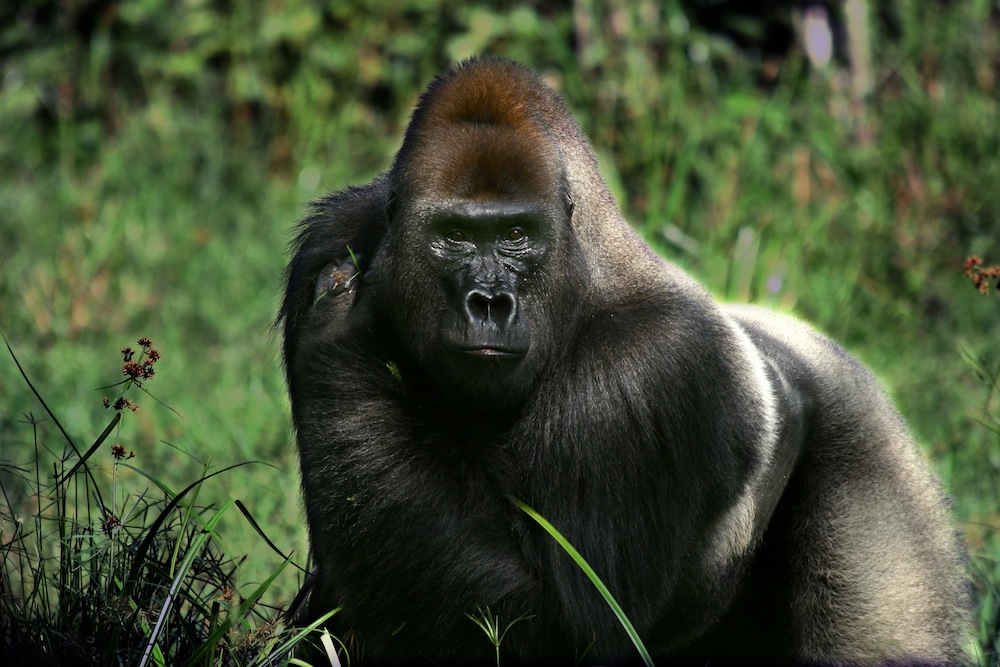
Silverback gorillas can broadcast their presence with a stinky stench, or turn off their scent to hide from strangers, new research suggests.
Researchers came to this conclusion after following — and sniffing — one male gorilla for months, and the discovery suggests these primates may be able to use scent to communicate in subtle social contexts, said study co-author Phyllis Lee, a psychologist at the University of Stirling in Scotland who studies primates.
Gorilla groups
Individual male gorillas head small groups of multiple females and their babies. When a male reaches maturity, it roams alone until it can start building its own harem. Male apes may wage fierce competitions for control of females, and lone males may even kill baby gorillas or others in the group. Most alpha-male gorillas can settle these disputes with a display of power involving lots of chest beating, vocalizations and hollering. [Top 10 Swingers of the Animal Kingdom]
Gorillas communicate with several distinct vocalizations but weren't thought to communicate by smell. That's in part because the relative size of the brain region for sensing smell has shrunk during the course of primate evolution, and partly because primates don't have a vomeronasal organ, a sense organ that detects pheromones in other animals, the researchers wrote in the paper.
But for years, gorilla researchers such as Dian Fossey anecdotally reported that each gorilla has a unique, and rather pungent, musky smell, Lee said.
Broadcast smell
Get the world’s most fascinating discoveries delivered straight to your inbox.
So Lee and her co-author, Michelle Klailova, also a psychologist at the University of Stirling who studies primates, spent 12 months following a wild male silverback gorilla in the Central African Republic rainforest as the ape tended to his harem and fended off competitors. The gorilla, whom they named Makumba, was a dominant male whose babies had a high survival rate, Lee said.
During this time, the team used independent researchers to detect Makumba's scent.
Makumba broadcasted his scent when he encountered other gorillas, as if to say, "I am strong, powerful and here, protecting my females and babies," Lee told Live Science.
Other times, when strange and potentially threatening silverbacks were near, Makumba abruptly shut off his scent.
"We think he was then trying not to tell the other male where and who he was," Lee said.
The scent broadcasting wasn't nuanced enough to be a language, Lee noted. But Makumba's smell changed depending on the situation, such as whether the youngest baby was nearby or with its mother, whether his female harem mates were around and which stranger gorillas lurked about, Lee said.
Conscious control?
The fact that Makumba could quickly turn this scent on and off in subtly different social contexts suggests that the ability was at least under some conscious control and not just an automatic response to fear or arousal, Lee said.
Makumba's ability also suggests that scent plays a greater role in primate communication than previously thought. It's possible that other apes, such as chimpanzees, also may use similar scent broadcasting, and humans are known to communicate with smell as well, Lee said.
"We all use scent to communicate all kinds of emotions and desires — which we enhance with perfumes," Lee said.
The findings are "mind-boggling," because primates rely so much less on their sense of smell than other animals, said Mireya Mayor, a primatologist with the Centre ValBio at Stonybrook University in New York, who was not involved in the study.
"The most surprising part is that they're able to suppress and consciously control scent," Mayor told Live Science. But though it seems strange to imagine consciously dialing body odor up or down, humans can consciously control basic physiological processes such as heart rate, and humans are genetically quite close to gorillas, Mayor said.
The findings were published today (July 9) in the journal PLOS ONE.
Follow Tia Ghose on Twitter and Google+. Follow Live Science @livescience, Facebook & Google+. Original article on Live Science.

Tia is the editor-in-chief (premium) and was formerly managing editor and senior writer for Live Science. Her work has appeared in Scientific American, Wired.com, Science News and other outlets. She holds a master's degree in bioengineering from the University of Washington, a graduate certificate in science writing from UC Santa Cruz and a bachelor's degree in mechanical engineering from the University of Texas at Austin. Tia was part of a team at the Milwaukee Journal Sentinel that published the Empty Cradles series on preterm births, which won multiple awards, including the 2012 Casey Medal for Meritorious Journalism.


